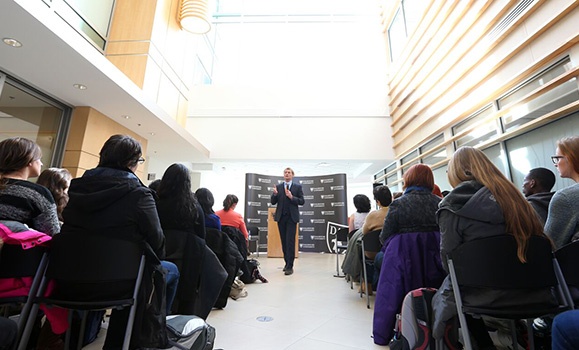Last Tuesday, Canada’s Chief Public Health Officer, Dr. Gregory Taylor, was on campus to talk with students from across health disciplines.
Dr. Taylor, a Dalhousie Medicine graduate and the second Chief Public Health Officer in Canada’s history, spoke frankly and openly with students about public health, the politics of influencing public health and the new government’s priorities. His main focus, though, was encouraging students to consider the public service as a career opportunity
“We want a variety of skill sets: people who think differently, have different approaches, different innovations, to work more collaboratively,” he said. “We don’t know what we’ll be facing but we’ve got to be prepared with well trained, energetic, individuals like yourselves.”
 Engaged conversation
Engaged conversation
Dr. Taylor took many questions from the audience throughout the afternoon, addressing everything from jobs with the federal government to how Canada can better promote public health in rural areas.
“He was very refreshing,” said Theresa McGuire, a clinical instructor in Dalhousie’s School of Nursing, who like Dr. Taylor made the transition from clinical practice into public health work. Dr. Taylor’s reasoning, as he put it, was that he “realized my patients would rather not get sick than get excellent treatment. As a doctor I could help thousands of people, now I can influence the health of the whole country”
“The advice he gave the students was great” said McGuire, referring specifically to Dr. Taylor’s comments about employment: Don’t rush. Travel. Keep your experience varied. You are more valuable to an employer with an assortment of experiences than you are with a lot of experience in one specific area.
The politics of health
While health care is largely a provincial responsibility, Dr. Taylor said it’s important to have a national health focus. “We have a budget of about $550 million, and most of that goes to early childhood development, disease prevention and health promotion.”
Dr. Taylor previously worked with the Laboratory Centre for Disease Control, and spoke with students about Canada’s role in outbreaks such as Ebola, SARS, Zika and H1N1. Disease prevention is one area where Public Health benefits from expertise well beyond the health fields: he mentioned how anthropologists and social scientists help understand how cultural customs influence the spread of disease.
Felicia Rushton, a student in Health Promotion at Dalhousie attended to learn about job opportunities within the Public Health Agency of Canada. She brought her friend Julie McEachern who works at the IWK in health promotion and prevention. McEachern said she was thrilled to have a chance to ask Dr. Taylor about his recent publication on alcohol consumption.
At the end of the afternoon many students stayed to speak with Dr. Taylor and Nina Latraverse a Public Health Agency of Canada Human Resources Advisor who accompanied Dr. Taylor. She provided students with information about careers in the public service as well as provided information on the Government of Canada’s Federal Student Work Experience Program (FSWEP). She recommended getting applications in as soon as possible.
Students with questions who were unable to attend can email Nina at students-etudiants@hc-sc.gc.ca.

